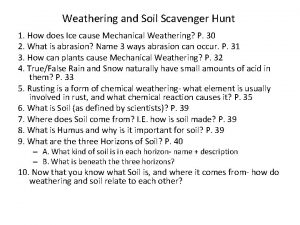Philosophy Scavenger Hunt You may work in pairs








- Slides: 8

Philosophy Scavenger Hunt You may work in pairs, with one person acting as a researcher and one person acting as a recorder. All of the answers can be found either in the Power. Point itself or on the websites provided.

Introduction �Rational human thought emerged for the first time in the Western world around the 6 th century B. C. in the Mediterranean. �Athens, Greece is known as the first world center of philosophy. �You will be able to answer questions 3 - 9 using the following website: • http: //www. historyguide. org/ancient/lecture 8 b. html

The Greeks �The Pre-Socratic Philosophers �The Sophists • According to Protagoras (c. 485 -c. 411 B. C. ), "Man is the measure of all things. " Everything is relative and there are no values because man, individual man, is the measure of all things. Nothing is good or bad since everything depends on the individual. �Socrates – for questions 11 - 13 �Plato – for questions 14 - 16 �Aristotle – for questions 17 - 20

The Beginnings of Modern Science �Copernicus – for questions 21 - 22 � Newton – for questions 23 - 24 �Machiavelli – for questions 25 - 27 �Francis Bacon – for questions 28 - 29 �Hobbes – for questions 30 - 31

Branches of Philosophy �Epistemology – for questions 34 - 35 �Logic • Logic is the study of the principles of valid inference and correct reasoning. Today the subject of logic has two broad divisions: mathematical logic and philosophical logic. �Metaphysics • Metaphysics is the study of the most general features of reality, such as existence, time, the relationship between mind and body, objects and their properties, wholes and their parts, events, processes, and causation. Traditional branches include cosmology and ontology.

Branches of Philosophy cont. � Moral Philosophy • Ethics or "moral philosophy", is concerned primarily with the question of the best way to live, and secondarily, concerning the question of whether this question can be answered. The main branches of ethics are meta-ethics, normative ethics, and applied ethics. Meta-ethics concerns the nature of ethical thought, such as the origins of the words good and bad, and origins of other comparative words of various ethical systems, whethere absolute ethical truths, and how such truths could be known. Normative ethics are more concerned with the questions of how one ought to act, and what the right course of action is. This is where most ethical theories are generated. Lastly, applied ethics go beyond theory and step into real world ethical practice, such as questions of whether or not abortion is correct. Ethics is also associated with the idea of morality, and the two are often interchangeable.

Branches of Philosophy Cont. �Political Philosophy • Political philosophy is the study of government and the relationship of individuals (or families and clans) to communities including the state. It includes questions about justice, law, property, and the rights and obligations of the citizen. Politics and ethics are traditionally inter-linked subjects, as both discuss the question of what is good and how people should live �Aesthetics – for questions 42 - 43

Other Great Thinkers �Please choose two of the following philosophers to complete questions 44 - 45. • • • Descartes Locke Voltaire Rousseau Marx Nietzsche















